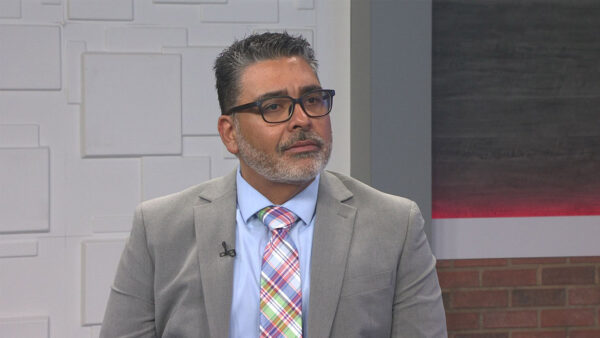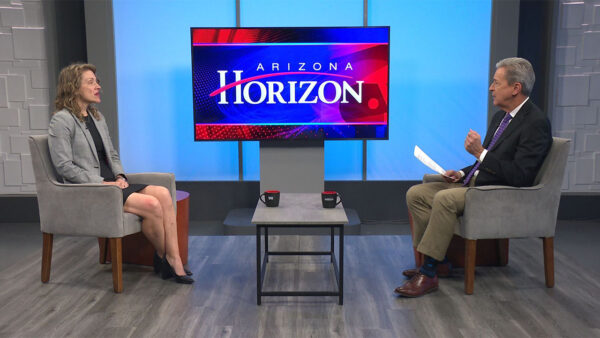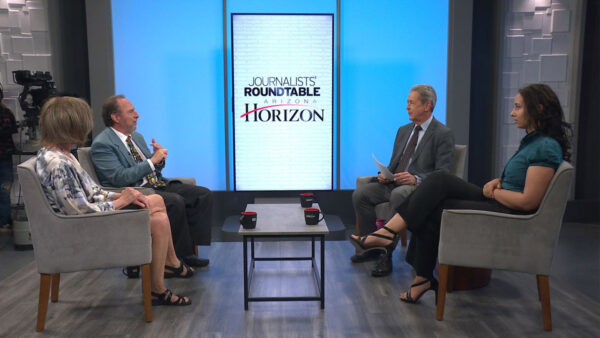Health care experts in Arizona are sharing their views on health care reform in meetings and conference calls organized by the White House Health Reform Task Force. One of the experts is from Arizona State University. She is Marjorie Baldwin, Director of the School of Health Management at ASU’s W.P. Carey School of Business. She joins Ted Simons on Horizon.
Ted Simons: GOOD EVENING AND WELCOME TO "HORIZON." I'M TED SIMONS. A NEW ARIZONA SUPREME COURT JUSTICE WAS NAMED TODAY BY GOVERNOR JAN BREWER. THE GOVERNOR NAMED JOHN PELANDER III OF TUCSON TO FILL A VACANCY ON THE COURT CREATED BY THE RETIREMENT OF JUSTICE RUTH McGREGOR. PELANDER, A REPUBLICAN, WAS CHOSEN FROM AMONG THREE NOMINEES. PELANDER HAS BEEN ON THE ARIZONA COURT OF APPEALS SINCE 1995. HEALTH CARE EXPERTS IN ARIZONA ARE SHARING THEIR VIEWS ON HEALTH CARE REFORM IN MEETINGS AND CONFERENCE CALLS ORGANIZED BY THE WHITE HOUSE HEALTH REFORM TASK FORCE. ONE OF THOSE EXPERTS IS A HEALTH ECONOMIST FROM ARIZONA STATE UNIVERSITY. MARJORIE BALDWIN, DIRECTOR OF THE SCHOOL OF HEALTH MANAGEMENT AT ASU'S W.P. CAREY SCHOOL OF BUSINESS, IS HERE TO TELL US HOW THE ARIZONA GROUP IS REACTING TO THE PRESIDENT'S PLANS. Thanks for joining us tonight.
Marjorie Baldwin: Thanks for inviting me.
Ted Simons: Let's get reactions. What should healthcare reform include and what should it avoid?
Marjorie Baldwin: I think the consensus, the broad consensus throughout Washington and the country is health reform needs to address the problem of the uninsured. That we really need to find a way so that everyone has access to at least basic medical care services.
Ted Simons: I know that's part of what is being looked at right now in Washington. It seems as though the big concern is what is being looked at is being rushed. How do you respond to that?
Marjorie Baldwin: I agreed. There's a lot of issues surrounding healthcare reform and it seems that deadlines have been placed on us. We'll have a bill by August 1st. No, we'll have the bill by August 15th. I think it's more important to get it right and accomplish your goals rather than set arbitrary deadlines.
Ted Simons: Some would say there's a sense of urgency of getting it done. Not a sense of rushed but a sense of urgency.
Marjorie Baldwin: I understand where that's coming from because we have tried healthcare reform for decades. Perhaps they think quickly we can get something going through. I think the down side, healthcare is a huge industry. Look at what they have done in Massachusetts. Costs escalated way beyond what they anticipated. The system is almost bankrupt. I think the sense of urgency has to be tempered with caution.
Ted Simons: I think the sense of urgency I think this Massachusetts they are looking at that. Do you think that's happening in Washington?
Marjorie Baldwin: Probably not. For one thing it's difficult to think through. So that for example one of the pieces of healthcare reform is that insurers can't turn away anyone based on a preexisting condition. What that means is can you wait to get insurance until you get a health condition and say by the way, now I have cancer and I'll go to an insurer and have health insurance. You have to think about all the ramifications and does it put in place for the plan.
Ted Simons: Where you sit may be incremental to healthcare reform. With the idea that it is so big and massive thing. Can you push the elephant? Don't you need to shove it a little bit?
Marjorie Baldwin: I think you can do an incremental approach. You can address some of the issues. For example, many economists have spoken about the issue of inequitable tax treatments of health insurance. I work at ASU, my health insurance is pre-tax dollars and essentially subsidized by the government. If someone works for small a employer or is self-employed they have to pay for insurance with post-tax dollars. There's no subsidy. That's in equitable and we can address that through the tax codes and see what happens and then there's another issue.
Ted Simons: Then there's the option of single-payer and get rid of business and what would essentially be government-run healthcare. Again your thoughts.
Marjorie Baldwin: A lot of the pressure for a national insurance system, national program comes from people observing countries in western Europe and Canada who have these national plans and they spend a lot less money. They have quality care. If we could only do that in the United States. I think if you look at those programs, you see that they--that they impose things to control costs that I think Americans would not be happy with. There's rationing of care. There's long wait times to get in to see care. Some care is just not simply provided because they decided it's not cost effective. I can't imagine Americans would want the government making those choices for them.
Ted Simons: And yet some say for a lot of Americans that sounds wonderful because they don't have health insurance. And when they can get into a medical facility it's usually by the way of the emergency room and that sort of thing. Is it a question of if you have the means, you don't want to see much changed? But if you're lower on the scale, bring it on?
Marjorie Baldwin: That's very interesting because whatever health plan is being put through the congressman and staff are not going to be part of it. They are keeping their own insurance. Yes, I agree that people who aren't currently covered, can't get coverage because of chronic conditions, a-public plan might look like a good option. I think we can address the excess issue with market force rather than going to a government plan.
Ted Simons: Are you confident the market forces will be part of the plan. It kind of looks like the public option is off the table, doesn't it?
Marjorie Baldwin: I think it's effectively off the table. I don't think they can get the coalition that they need of the republicans and more conservative democrats to go along with the plan that includes a public option.
Ted Simons: Quickly, the ASU the masters of public health program. Talk about this. This deals mostly with urban issues?
Marjorie Baldwin: Yes, yes. To link it up with healthcare reform, I think one mistake we are making with health reform is we are focusing on the health system and think if we do that, then all our health problems will be resolved. That's not the case. Many of the problems come from environmental aspects and behavioral aspects and this will address exactly that at-risk communities and how we can promote healthy and safe communities in urban settings.
Ted Simons: This will be based in downtown Phoenix.
Marjorie Baldwin: It will be based--all the classes will be offered in downtown Phoenix and the students will be engaged in public health projects from the beginning throughout promoting public health in the urban center.
Ted Simons: Last question. This time next year will there be fundamental substantive change in healthcare in America?
Marjorie Baldwin: Yes. But I wouldn't predict whether it would come from the government or whether it would come from other forces that are pushing for change.
Ted Simons: All right. Fair enough. Thank you for joining us.
Marjorie Baldwin: You're welcome.
Marjorie Baldwin:Director, School of Health Management at ASU's W.P. Carey School of Business;




















